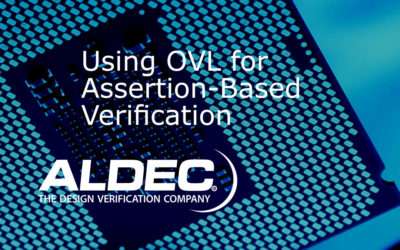In this webinar, we will introduce transaction-level methodology (TLM), and how it can be used for verifying PCIe-based FPGA designs for DO-254 compliance. Transactions are easier to manage and correlate with the simulation results, therefore traceability is much easier to establish. Also, the untimed testbenches used with TLM are not sensitive to clock frequency and phase changes, which is ideal for verifying PCIe-based FPGA designs with non-deterministic behavior.
We will also show a complete flow using TLM from simulation all the way to target FPGA physical testing with our popular CTS platform.
Agenda:
- Typical architecture of PCIe-based FPGA design
- Verification challenges
- Introduction of TLM
- Differences between bit-level and transaction-level
- Benefits of TLM
- Simulation + target FPGA physical test using TLM
- Q&A
Essential steps to simplify VHDL testbenches with OSVVM
This Getting Started webinar focuses on the first, essential steps you need to take if you want to improve your VHDL testbench approach with OSVVM.
Checking AXI connections with ALINT-PRO and Riviera-PRO
AXI has become the most popular internal bus protocol with today’s FPGA and SoC FPGA designs. ALINT-PRO enables FPGA designers to extract, review and statically verify AXI bus interfaces. In addition, ALINT-PRO can assist with automatic generation of test harnesses...
FPGA Design – Verification Code, Functional and Specification Coverage
Functional coverage is often mentioned together with constrained-random verification, which is a great combination.
FPGA Verification Architecture Optimization with UVVM
How to make a simple, well-structured, and efficient testbench using the open-source Universal VHDL Verification Methodology (UVVM) architecture.
FPGA Design Architecture Optimization
The FPGA design architecture is the single most important and primary factor in achieving development efficiency, quality, and reliability. The difference between a good and a bad design architecture can be about 50% of the workload.
Using SVA for Requirements-Based Verification of Safety-Critical FPGA Designs
Thursday 10. March from 3.00 pm to 4.00pm Requirements-based verification (RBV) is a popular verification process for FPGA designs used in safety-critical systems. The effectiveness of RBV is limited by the quality and precision of the requirements. Verification...
Increase your productivity with Continuous Integration flows
In a team environment, verification engineers push code changes every day, and sometimes several times a day, to a shared repository. Each change has the potential to introduce new bugs into the design. Accordingly, when many changes are being made, it is difficult to...
Constraint Random Verification with Python and Cocotb
Cocotb, an approach to using Python as a testing language, allows developers to start with small, directed test benches and evolve them into more thorough constraint random tests.
Using OVL for Assertion-Based Verification of Verilog and VHDL Designs
Open Verification Library (OVL) is a library of property checkers for digital circuit descriptions written in popular Hardware Description Languages and maintained by Accelera. The OVL checkers could be used not only in dynamic simulation, but also in formal...
The most error prone FPGA corner cases
Cycle related corner cases are probably the worst and main reason for undetected bugs on many FPGAs. To explain this in a simple way, – a cycle related corner case is for instance if you have an event counter where the number of counted events is critical and you read and reset this counter at regular intervals.










